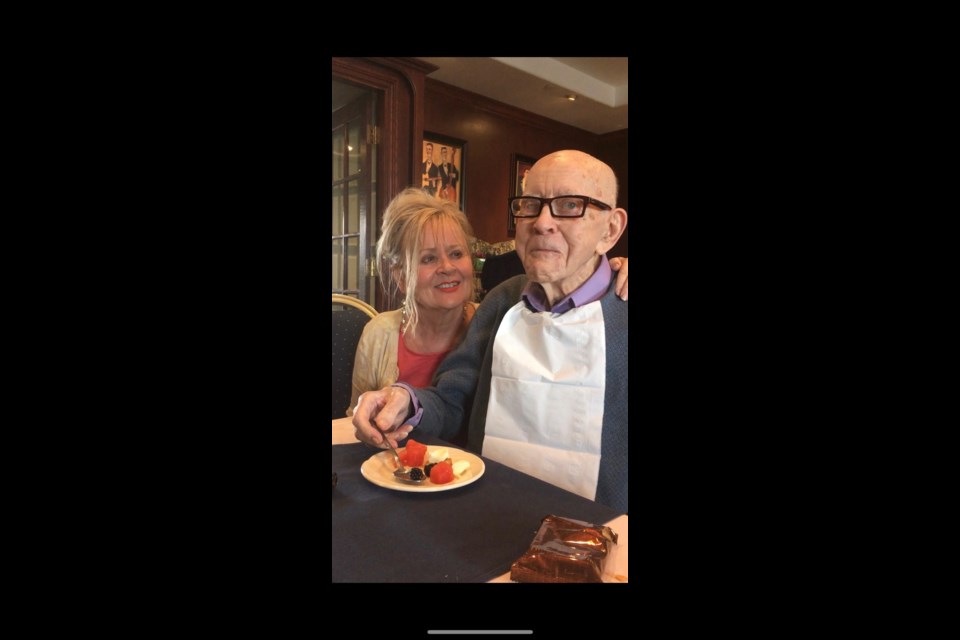Moira Quigg Lee was grieving the death of her mother and supporting her cancer-stricken father when she found unexpected relief through an end-of-life doula.
"At the very end, she was a phenomenal source of comfort for me," said the Sylvan Lake woman, adding she had never heard of the term before hiring Beverley Shiels.
Lee’s 88-year-old father, James, was losing his fight with bone cancer and had just been transferred from his home to a St. Albert hospice when a nurse asked, "Do you want to be your father’s daughter or do you want to be your father’s caretaker?’ That resonated with me,” said Lee, who decided it was time for an end-of-life doula, one the family already knew through her volunteer work for a death advocacy group.
"I knew when I needed a little time for myself, she could be there," said Lee, who had been caring for her dad since he was diagnosed with bone cancer in 2016. "She had an ability to connect with my dad."
Lee, who was recovering from brain surgery at the time, added, "I can't express the level of peace I had. I did not have to guard my emotions."
"It's not just a matter of a soul sitting there. It's the ability to connect with people in a way that perhaps families don't think to do because you are so immersed in the pain and joy of that moment."
On July 17, 2019, James Quigg passed away, about 11 months after his wife, Mary, 86, died.
And more than three years later, a personal connection has developed between daughter and doula.
"We remain friends. It's a huge part of my gratitude," said Lee.
End-of-life doulas a growing group across the country
Shiels became an end-of-life doula seven years ago after a long career in municipal government. She describes her new career as, "heart-centred work."
“We're answering a call," said the St. Albert woman, adding she never refers to herself as a death doula. The word doula is derived from Greek, meaning ‘a woman who serves'. “People don’t like the word death. They run away."
Shiels is among a fast-growing number of independent holistic counsellors who focus on the physical, emotional, psychological and spiritual aspects of death. While not regulated, most death doulas have been certified by the End of Life Doula Association of Canada (EOLDAC). https://endoflifedoulaassociation.org/
Sue Phillips, vice-president of EOLDAC, says anyone applying to be registered as one of these non-medical professionals must meet minimum requirements, including education, training and police background checks. The number of doulas has grown from 30 across Canada when the association was formed seven years ago, to about 500 today.
Phillips says being regulated would help validate end-of-life doulas as an integral part of the health care system.
"We are not there to replace anyone. We are there to add to that circle of care," she said.
Edmonton death doula Rayne Johnson is a board member with the Alberta Hospice Palliative Care Association. She says demand is growing for death doulas, because, "we help bridge the gap between palliative care and the funeral home."
Personal experience an impetus for taking on a new career
In Lethbridge, Tonya Woolford became a death doula after a series of personal tragedies more than a decade ago.
Over a 12-month period in 2012, her partner and six other close relatives passed away.
"It shook my world," said Woolford, who was left to navigate through the grief with little support. But the effect of those losses stayed with her until she learned about death doulas and knew it was her calling.
She left her career at a long-term care facility and went through online training to receive certification through B.C.’s Douglas College. Woolford started her home-based business in 2019.
"You are changing people's live," said Woolford, who grew up on a ranch and says she has always been comfortable with death. "I'm giving that gift back. I've lived that life."
After being contacted by the client or a family member, Woolford meets and gets the person's blessings before providing services that can include legacy planning, funeral arrangements or simply holding the dying person's hand. And whatever a person's faith or beliefs, those can be accommodated too, she says.
Discussions can also include Medical Assistance in Dying, said Woolford. "We will recommend information if they want to explore the MAID program."
While fees vary depending on the service provided, the average cost for a death doula is about $60 per hour.
"We give them the road map they need. We do not provide any personal care. We are guiding and interacting with people," she said. "We help prepare people to have those conversations of what is going to happen. We connect the dots for the family."




